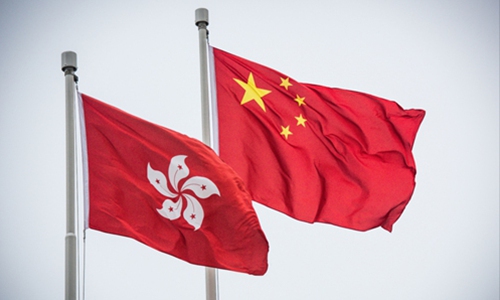HOME >> OPINION,SPECIAL-COVERAGE
Hong Kong needs to introspect its future
By Tian Feilong Source:Global Times Published: 2019/11/27 18:43:40

Photo: IC
With the pan-democracy camp capturing more than half of the 452 seats in the 2019 Hong Kong District Council elections, the city has come to a political turning point. It was an election held amid constant violence in the city. The result could be somewhat distorted, but the outcome can be seen as so-called mainstream public opinion. However, it also showed that level-headed thinking of the city is on the wane.I don't believe most Hongkongers would like to see chaos continue in their city. They wish for change, but their indignation and unwise choices would further push the city toward an abyss. The outcome of the election would mislead outsiders into believing that the so-called mainstream public opinion in Hong Kong is in favor of violence and confrontation while going against integration with the Chinese mainland.
But what concerns me more is Hong Kong getting lost.
The jurisprudence and fidelity to the Basic Law and "one country, two systems" principle have not been established in Hong Kong, a city that still completely follows the "colonial" system under the common law and adopts practices consistent with the West. This is one reason behind the results of the latest district council elections.
The Hong Kong government failed to deal with local youngsters according to the rule of law. The youth believe they can find justice by breaking the law. From the 2014 illegal Occupy Central movement to the current unrest sparked by the now-withdrawn extradition bill, the political landscape of Hong Kong has been increasingly polarized and radicalized.
The central government promotes rule of law in Hong Kong but it cannot persuade Hongkongers to follow its lead as the "two systems" concept has been misunderstood. Meanwhile, local groups' appeal for "democracy and welfare" targets the contradictions and demands of people under Hong Kong's capitalist democracy.
Moreover, Western forces have been exercising influence in the city, which makes some Hongkongers believe they can challenge the "one country" principle.
When China-US ties were better and the "two systems" were getting along with each other, Hong Kong enjoyed the benefits of globalization. But when the world's two largest economies clashed and the globalization order is changing, the city is facing an epochal puzzle - Where will it go?
The election result reflected a majority of Hongkongers' misunderstanding of "one country, two systems" principle, the Basic Law, the rejuvenation of the Chinese nation, and the community of shared future for mankind.
The citizens of Hong Kong have only come across anti-China information in a world with freedom of information; they cannot perceive the changes in relations between China and the world although they stand at the pinnacle of globalization; they choose to wait and see and even run away when the Chinese nation is in a "golden era" of rejuvenation.
Whatever be the result of various elections in Hong Kong, the city's autonomy and China's sovereign right on the city will never change. The Hong Kong opposition can continue to force public opinion and collude with foreign forces to achieve political goals, but it is the city - not pro-establishment camp or the central government - that will suffer.
As Hong Kong tends to close its doors, it will continue losing attraction for elites from the Chinese mainland and the rest of the world. As a result, the city's status as a financial hub and its reputation for higher education would be seriously affected. The window won't be open too long for Hong Kong to seize the opportunity under the framework of the Guangdong-Hong Kong-Macao Greater Bay Area and the Belt and Road Initiative.
After Hong Kong returned to the motherland, China has become the world's second-largest economy and a power to shape the global order in the 21st century. Even if it positions itself on the opposite side of the central government, Hong Kong won't influence much of the country's development.
All walks of life in Hong Kong should calm down and introspect after the district council election: Can violence really solve the problem? Does Hong Kong's future lie in keeping distance from China's national strategy and system? Will its unconditional and unlimited trust in the West really benefit the city?
It is easy to forge "public opinion" by spreading fear and violence. However, it is also an obligation of elites to educate and guide people to think rationally and jointly figure out the best way to realize local interests. Regrettably, Hong Kong's governing and cultural elites have abandoned this responsibility.
No Hongkonger should be absent in the great discussion about the city's future. How Hong Kong can better integrate within the country is a topic more valuable than the "public opinion" trend in a specific election.
The author is associate professor at Beihang University in Beijing and member of Beijing-based Chinese Association of Hong Kong and Macao Studies. opinion@globaltimes.com.cn
Posted in: VIEWPOINT,OPINIONS